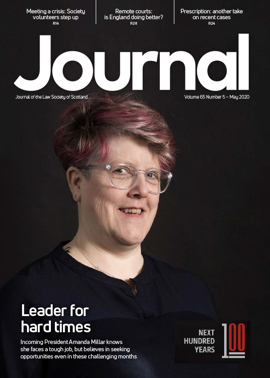Why should the legal profession remember?

The 8 May 2020 commemorates the 75th anniversary of the end of World War 2 and the downfall of Nazi Germany. This date is important not only for those who survived such turbulent events, but for those of us whose knowledge of the Nazi regime derives from the chilling testimonies of those survivors. As their number declines, we owe responsibilities to them to remember the Nazi atrocities epitomised by the Final Solution, with the wholesale discrimination against and elimination of groups such as the Jewish people.
The “unimaginable horror” of discovering sites like Belsen as the war approached the end, must not be allowed to repeat.
We reflect on the role that members of the legal profession undertook in implementing these policies then, as we seek now to fulfil our statutory responsibilities to work in the public interest and promote the rule of law in creating a fairer Scotland. The legal profession must learn from our German predecessors to ensure that genocidal regimes cannot recur. Our roles in legal scrutiny illustrate how we can support measures to prevent such oppression.
Law and the Final Solution
The actions of the legal profession in Germany were crucial.
The judiciary, traditionally tasked with upholding rights, ensured that the policies of National Socialism were applied in German courts. Those such as Roland Freisler, the People’s Court judge, acted as judge, jury and prosecutor.
Lawyers drafted and implemented the new laws that excluded Jewish legal colleagues from practising professionally, thereby offering business opportunities to other colleagues. More than half of the delegates attending the Wannsee Conference in 1942 to co-ordinate and resolve specific questions around the implementation of the Final Solution were lawyers, or had had a legal education.
Though many lawyers were complicit in the new regime, there were those who lost their lives in opposing it, such as Adam von Trott zu Solz, a Hitler bomb plot conspirator.
Ultimately, more than 400 decrees and regulations were passed in the Third Reich affecting the Jewish people, depriving them of their rights, livelihoods and assets. These were achieved with “legal” authority derived from the Enabling Act (the “Law to Remedy the Distress of the People and the Reich”), emergency legislation passed on 23 March 1933. Though such laws might be considered to be fundamentally immoral, the legal philosopher Hart argued that “the courts [had] no alternative but to apply a properly enacted statute however evil its aims may be. A victim of such law may rebel on moral grounds but, legally speaking, he has no case; he must, at his own risk, choose between his (legal) duty to obey the law and his (moral) duty not to do or abet evil” (from the account of this debate in “On the validity of Judicial Decisions in the Nazi Era” (1960) 23 Modern Law Review 260).
What can we do?
Turn now to COVID-19, where scrutiny of the legislation being passed by the Government is critical. We respect the “emergency” justification for restrictions on our individual liberties such as freedom of movement, screening and isolation, prohibiting events, shutting down of courts and delaying trials. However, such powers carry an inherent risk of abuse by increasing executive power, enabling governments to make decisions and in impeding access to information restricting effective oversight. The effects of isolation and discrimination on vulnerable groups such as the elderly can be clearly seen.
Heed warnings from Nazi Germany, where the Supreme Court took no action as lawyers were convinced of the legitimacy of what was happening and supported the regime. Scrutiny of draft legislation now – and as we return to the “new normal” – is vital.
On a positive note, crucial in Scotland’s fight against discrimination, an important milestone was reached with the introduction of the Hate Crime and Public Order (Scotland) Bill. This bill consolidates by modernising our mismatch of existing hate crime laws and adds to the number of groups afforded protection. However hatred arises, be it anti-Semitism or racism, sexism or gender orientation, it cannot be tolerated. This keynote legislation should ensure its eradication.
On 8 May 2020, we recall how lawyers and the law assisted in forming and delivering National Socialism policies. As flags are waved and veterans such as Captain Tom Moore are lauded, don’t forget that without lawyers, whether in the civil service implementing Government policies, in practice or in court, the Final Solution might never have been achieved. As the US Supreme Court Justice Stephen G Breyer stated in Lawyers Without Rights: The Fate of Jewish Lawyers in Berlin after 1933, “it is important that we and future generations remember the misuse of laws in Germany and how it permitted a society to effectively purge a significant group of lawyers solely because of their religion…It is about misuse of law”.
Perspectives
Features
Briefings
- Steps to restraining the press
- The CJRS: a developing picture
- COVID-19 and AWI: the Society's blueprint
- Give me liberty or give me an ECHR-compliant lockdown!
- Pensions and the pandemic
- Secure digital signatures: moving forward in a crisis
- PSG: progress during the pandemic
- In-house, from home
- Scottish Solicitors' Discipline Tribunal







